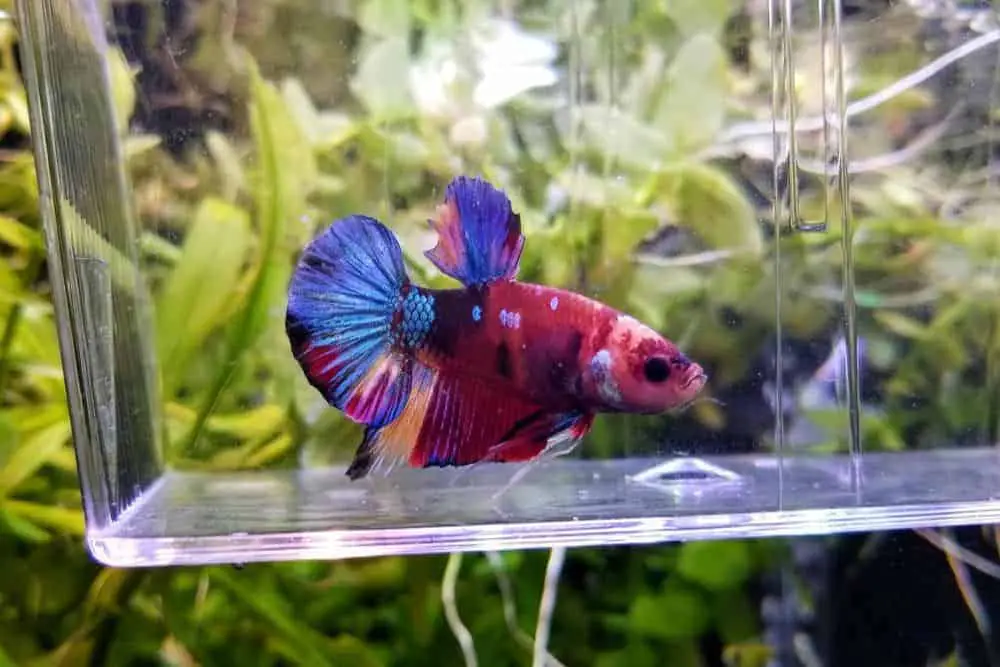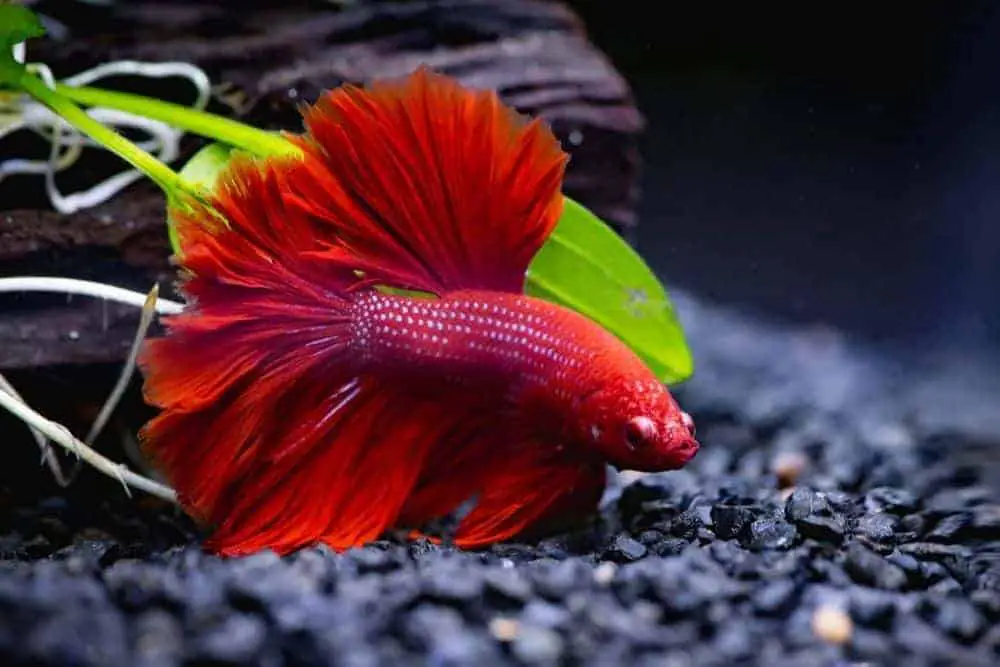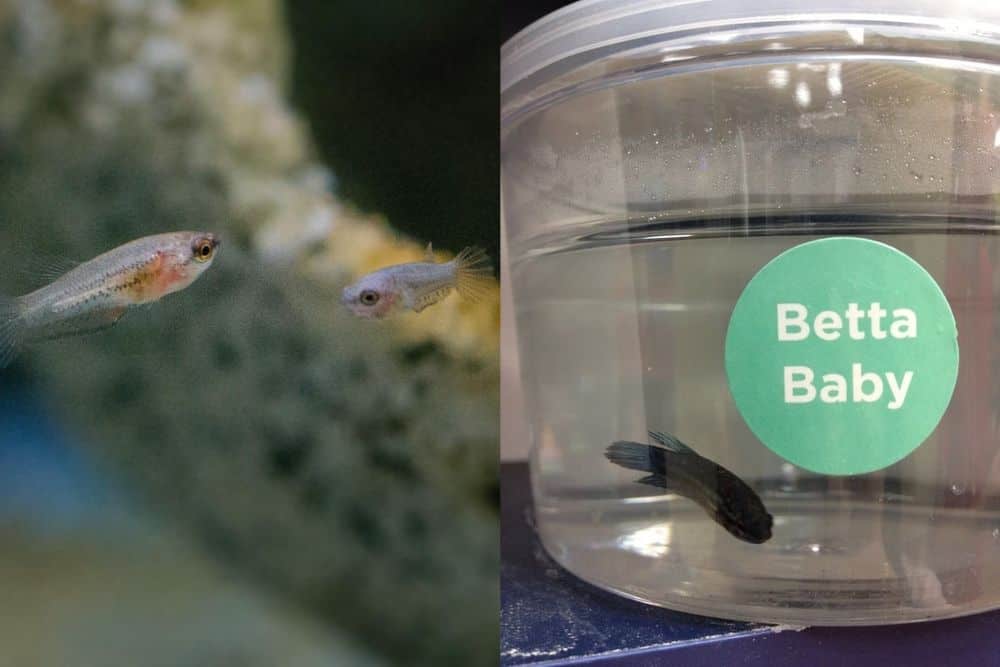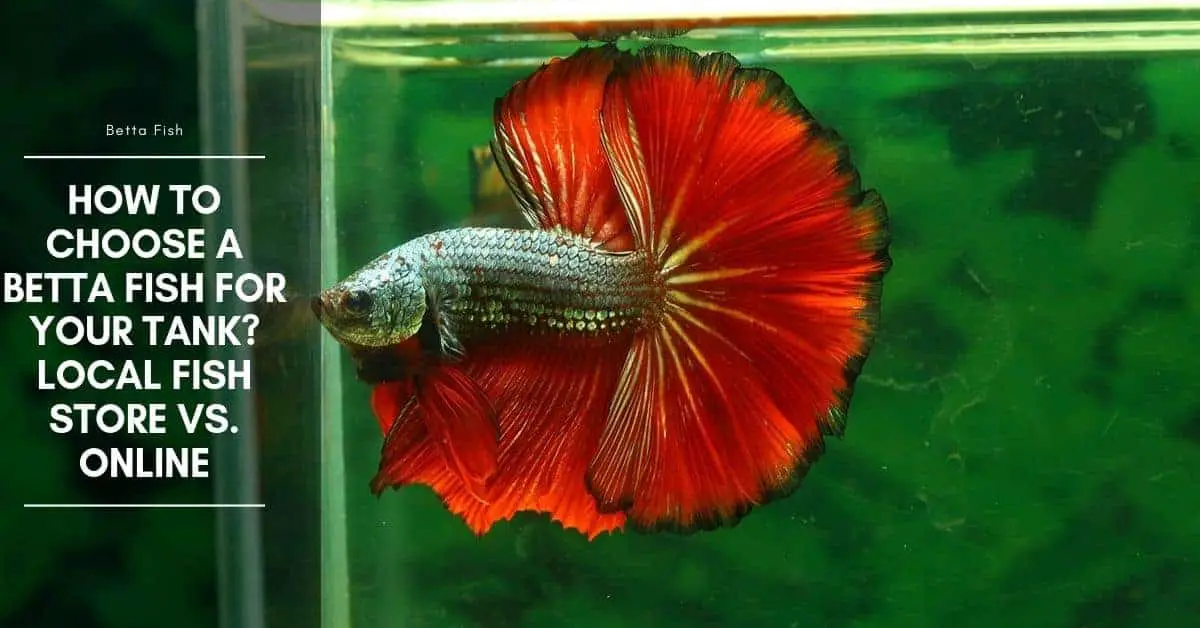So what betta is right for you? When staring at a wall of every color betta under the sun or a never-ending list of online auctions, how do you know which to choose?
The obvious answer is, “whichever one you like the look of”, right? Honestly, yeah. Unless you’re at the point of selecting show-quality bettas for breeding, you don’t need to worry about how many rays their tail has or how precise their coloration is or anything like that (and if you’re at that point, I doubt there’d be a need for you to read this book). For you, appearance and attitude are most important.
Purchasing a betta fish from a local store
If you’re purchasing a betta from a local store, be on the lookout for ones that perk up or flare when you approach. If the betta isn’t super active, that isn’t necessarily a cause for worry by itself as the betta may be resting—being stuck in a tiny cup with dubious water quality would tucker anyone out. Most tend to be between six months and a year old when sold, but older bettas will typically have larger bodies.

Betta fish colors
Color is probably going to be the biggest thing that attracts you to particular betta, and for good reason! While wild bettas are much plainer in fin shapes and colors, ornamental bettas have been bred in a dizzying array of types and hues.
However, be aware that bettas often change color overtime for a couple of reasons. First, stress makes a betta go pale or even develop temporary stripes in extreme cases. Once they get home and settled into a better environment, they’ll often get darker or even change the color entirely! A varied, protein-filled diet can also help them develop good coloration. Finally, there’s a marble gene present in many bettas that can cause unexpected color change throughout the fish’s life. Some bettas look mottled, to begin with so it’s not necessarily a surprise, but solid-colored betta may carry the marble gene and there’s no way to tell until it changes.
Betta fish fins
Check the betta’s fins to make sure they don’t have holes or look shredded. Tail biting can be a sign of stress, but it could also be fin rot from poor water conditions. Both gills should be able to open and close and the betta should not be gasping for air.
API STRESS COAT Aquarium Water Conditioner 16-Ounce Bottle
Tetra AquaSafe Plus, 8.45 Ounces, aquarium Water Conditioner And Dechlorinator, Model Number: 46798162681
$10.19 (as of February 1, 2026 04:27 GMT +03:00 - More infoProduct prices and availability are accurate as of the date/time indicated and are subject to change. Any price and availability information displayed on [relevant Amazon Site(s), as applicable] at the time of purchase will apply to the purchase of this product.)API TAP WATER CONDITIONER Aquarium Water Conditioner 16-Ounce Bottle
$8.48 (as of February 1, 2026 04:27 GMT +03:00 - More infoProduct prices and availability are accurate as of the date/time indicated and are subject to change. Any price and availability information displayed on [relevant Amazon Site(s), as applicable] at the time of purchase will apply to the purchase of this product.)Other signs of illness include fuzzy patches that look like mold, open wounds, bulging eyes, bloating, scales that stick out from the betta’s body like a pinecone, and little white dots that look like grains of sugar stuck to their bodies and fins.
While many of these things can be cured, unless you’re willing to put in extra time and money to try and save the betta’s life, it’s probably better for an inexperienced betta owner to go for healthy, active betta instead.

Baby betta fish
Some pet stores also sell baby fish, often very cheaply, and I know it may be tempting to want to purchase one and watch it grow. Believe me, I know—I couldn’t help but take a little red baby boy betta home with me. In general, however, I would advise against it. Baby bettas are far more fragile than adults, sometimes sold before they’re really old and strong enough to be.
In general, they tend to be the “culls” that suppliers don’t think will grow up to be one of the prettier, more expensive types. It’s also almost impossible to sex such young bettas even for experienced breeders, leading many males to be sold as females and vice versa. The beginning betta keeper is much better off selecting a young adult instead of a baby.
I won’t shame anyone for purchasing a “cup betta” from a large retail chain, but I will say this: it can be very, very tempting to “rescue” a betta from poor conditions by purchasing it. While the motive behind that is obviously very kind, one sold betta means another one will take its empty place on the store shelf. So long as cup bettas sell, large stores will continue to sell them that way. If this is something that bothers you, I encourage you to consider purchasing your betta from a reputable breeder either locally or online.

Buy your betta fish online
Thankfully, the internet makes that possible! You can now easily get betta fish shipped to you across the country or even across the planet. I did this with my most recent betta and couldn’t be happier. Yes, shipping the fish does stress them out a bit, and there’s a chance that they won’t survive. But pet stores get their bettas shipped to them, too, and there’s still no guarantee that a seemingly healthy pet store betta won’t suddenly die, either. Unfortunately, that’s part of owning an animal. They can’t tell us what’s wrong and we can’t always see it, so we have to do the best we can.
The major upside of ordering online is that breeders will typically be showing you pictures or videos of the exact fish you’ll receive and their standards of care tend to be higher than tiny cups sitting on shelves. It’s also much easier to find specific colors or tail types if you have an idea of what you’re looking for since that can be very hit-and-miss in physical stores.
Facebook groups
Country-specific Facebook groups are also good place to turn. No matter where you choose to order from, take some time and look through the seller’s reviews. As I mentioned, there’s still a chance that a seller’s fish may arrive to the buyer dead on arrival, but that should be rare.
Any good seller will take steps to ensure the safety of your betta, such as including heat or cold packs if the weather demands it, refusing to ship the betta if the temperature is outside an acceptable range at the destination, and only shipping at the beginning of the week to ensure that the betta doesn’t get stuck sitting in the post office over the weekend. You can also usually contact the seller before shipping and ask them to have the package held at the post office for you to pick up, rather than have it possibly delivered while you aren’t home.
If you’re thinking about ordering betta fish online, there are a couple of things to know. Most important is that you pay attention to where the seller is. While many auctions are from importers in the United States (or whatever your country may be), an equal amount are selling fish directly from their betta farms in Southeast Asia, typically Thailand and Malaysia. Shipping on these auctions is very cheap, but there’s a bit of a catch: the bettas won’t come directly to you and you will have to pay a second shipping cost that could be anywhere from $15-$50. It will also take a while before you receive your betta, possibly one or two months.
Breeders spend bulk orders of bettas go to a designated trans shipper within your country who has a license to import animals. Th transshipped then splits the orders up and sends each betta out to their final destination. The sellers typically list the transshippers in the auction and it’s up to you to contact them and arrange for that secondary shipment before purchasing the betta.
In summary
Even if you decide you’d rather purchase a betta in person, it might be worthwhile to take a bit of time and look through the fish available online so you can start to decide on the colors and tail types you like.

Hi, my name is Sean, and I’m the primary writer on the site. I’m blogging mostly about freshwater and saltwater aquariums, fish, invertebrates, and plants. I’m experienced in the fishkeeping hobby for many years. Over the years I have kept many tanks, and have recently begun getting more serious in wanting to become a professional aquarist. All my knowledge comes from experience and reading forums and a lot of informative sites. In pursuit of becoming a professional, I also want to inspire as many people as I can to pick up this hobby and keep the public interest growing.
Read more about Sean.
Please join also my Facebook group.




















